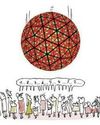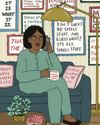Our first three years are a blur, and we don’t recall much before the age of seven. It turns out those early memories aren’t merely tucked away.

I’M THE YOUNGEST by far of five children. By the time I started first grade, my siblings were gone, and we went from a very noisy household to a very quiet one.
My family has told me stories about those early years before my siblings left. How my brother ambushed me around corners with a toy crocodile. How my oldest sister carried me like a kangaroo with her Joey. But I can offer very few stories of my own from that time.
Hardly any adult can. There is a term for this—infantile amnesia, coined by Sigmund Freud to describe the lack of recall adults have of their first three or four years and their paucity of solid memories until around age seven. There has been a century of research about whether memories of these early years are tucked away in some part of our brains and need only a cue to be recovered. But research now suggests that the memories we form in these early years simply disappear.
Psychologist Carole Peterson of Memorial University of Newfoundland has conducted a series of studies to pinpoint the age at which these memories vanish. First, she and her colleagues assembled a group of children between the ages of four and thirteen to describe their earliest recollections. The children’s parents stood by to verify the memories, and even the youngest kids could recall events from when they were around two years old.
The children were interviewed again two years later. Nearly 90 percent of the memories initially offered by those ten and older were retained. But the younger children had gone blank. “Even when we prompted them about their earlier memories, they said, ‘No, that never happened to me,’” Peterson said. “We were watching childhood amnesia in action.”
Diese Geschichte stammt aus der February 2017-Ausgabe von Reader's Digest US.
Starten Sie Ihre 7-tägige kostenlose Testversion von Magzter GOLD, um auf Tausende kuratierte Premium-Storys sowie über 8.000 Zeitschriften und Zeitungen zuzugreifen.
Bereits Abonnent ? Anmelden
Diese Geschichte stammt aus der February 2017-Ausgabe von Reader's Digest US.
Starten Sie Ihre 7-tägige kostenlose Testversion von Magzter GOLD, um auf Tausende kuratierte Premium-Storys sowie über 8.000 Zeitschriften und Zeitungen zuzugreifen.
Bereits Abonnent? Anmelden

Cookies for Forgiveness
My blowup was half-baked. The apology wasn't

Puff the Magic Pastry
It always rises to the occasion

New Year's Traditions Around the World
1 MOST OF US spend the final seconds of each calendar year watching a nearly 12,000-pound geodesic sphere descend over Times Square in New York City.

Mom's Wall-Sign Wisdom
She never met a plaque or bumper sticker she didn't quote

Protect Your 'Holiday Heart'
This joyful time of year can also be dangerously stressful

Heroes of the Holidays
It's not just Santa Claus bringing the holiday magic this season. As you'll see, he's got elves all over.

The Man Who Looks After His Wife's Ex
For him and his bride, \"in sickness and in health\" meant something really special

How Risky Are Those Holiday Cocktails, Really?
The latest recommendations about drinking and your health

HOW ONE KENTUCKY TOWN SAVED ITSELF
Downtown Hazard had lost its small-town mojo to drugs. Former addicts are helping to bring it back.

Dream It, Do It, Done!
Your bucket-list goals, accomplished